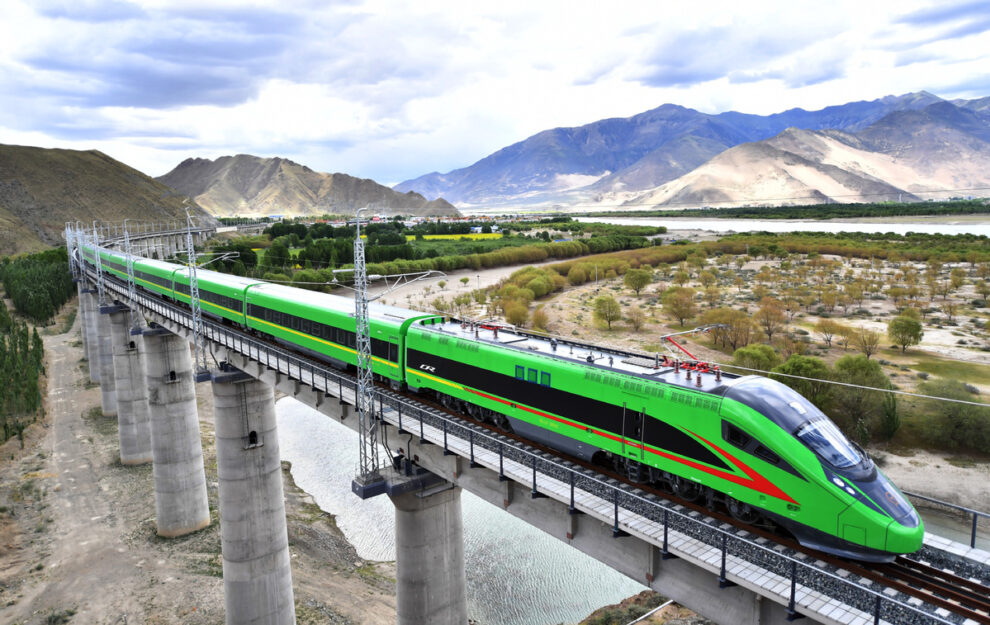China has kickstarted its plans to boost its railway project that links Xinjiang and Tibet to improve supply chain and energy security. In a strategic move to bolster its infrastructure and secure economic and territorial interests, China is set to accelerate the construction of strategic railway links in the autonomous regions of Xinjiang and Tibet. Liu Wenxian, a senior official with the China Railway Group’s planning department said, “These efforts aim to fill in the gaps in the current rail network, facilitating the implementation of major national strategies”.
This project will also integrate these areas more closely with the national and international supply chains, while also strengthening the nation’s energy security. China has been undertaking extensive infrastructure development to support and enhance its economic growth. The Chinese government has countlessly stated their commitment to establishing significant investments in transportation, energy, digital infrastructure, and urban development. This, enabling the country to integrate regional economies, facilitate trade, and improve the quality of life for its citizens.
China’s rapid economic growth over the past few decades has been significantly supported by its ambitious railway projects. These projects have not only enhanced domestic connectivity but also positioned China as a central player in global trade. Examples of this are the Beijing-Guangzhou High-Speed Railway, also known as the Jingguang HSR, which is one of the longest high-speed rail lines in the world, stretching over 2,298 kilometres, and the Shanghai-Kunming High-Speed Railway, which is a 2,252-kilometre rail line connecting Shanghai on the east coast with Kunming in the southwestern Yunnan province.
Xinjiang and Tibet hold substantial geopolitical and economic significance for China. Xinjiang is a key node in the Belt and Road Initiative (BRI), connecting China with Europe, the Middle East, and Africa through a network of trade routes. The region is rich in natural resources, including oil, natural gas, and coal, making it critical for China’s energy strategy. Tibet, on the other hand, is strategically important for water security and acts as a buffer zone with neighbouring countries. China plans to continue improving and setting a benchmark of the world’s largest high-speed rail network, with plans to further expand it.
This network reduces travel time between major cities, promotes tourism, and facilitates business travel. The improved connectivity helps integrate regional economies and boosts local industries. The construction of new rail lines will enhance connectivity, reduce travel times, and increase the capacity for freight transportation. This is crucial for the movement of energy resources and raw materials, facilitating smoother and more efficient supply chains. High-speed rail links will significantly cut travel times for passengers, promoting tourism and economic activities in these regions.
Improved mobility will also contribute to regional economic development by making it easier for the workforce to move. China is also one of the leading countries when looking at technological advancements. These developments will incorporate cutting-edge technology and infrastructure, including advanced signalling systems and safety measures, to ensure the reliability and efficiency of the rail network, which is essential for maintaining uninterrupted supply chains. Enhanced rail links will integrate Xinjiang and Tibet more closely with China’s central and eastern regions, ensuring a smoother flow of goods.
This integration is vital for maintaining efficient supply chains, particularly for industries dependent on raw materials from these regions. It will also facilitate the export of local products, boosting regional economies.
Improvements in transportation links to resource-rich Xinjiang, China aims to secure a steady and reliable supply of energy resources. This is particularly important as the country seeks to diversify its energy sources and reduce dependence on foreign oil and gas. The improved rail network will enable the more efficient transport of energy resources from Xinjiang to the rest of China, enhancing overall energy security.
The rail projects are expected to stimulate economic growth in Xinjiang and Tibet by attracting investment, creating jobs, and promoting industrialisation. Improved infrastructure will also enhance access to markets, enabling local businesses to expand and thrive. China’s major railway projects have played a critical role in boosting the economy by enhancing connectivity, promoting regional development, and facilitating trade and tourism. These projects are a testament to China’s commitment to infrastructure development as a means of sustaining economic growth and integration.
China’s initiative to boost rail links to Xinjiang and Tibet is a strategic move that will integrate these regions more closely with the national economy. The country seeks to leverage their economic potential while securing vital resources. China continues to underscores China’s long-term vision of sustainable development and regional stability as an emerging superpower.
Source: BGTN















